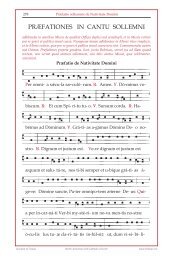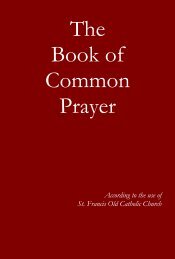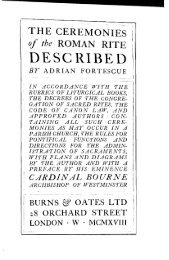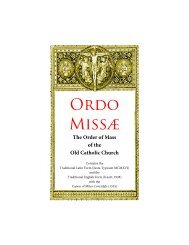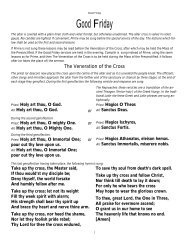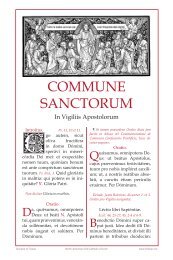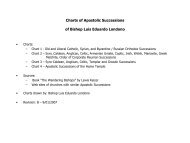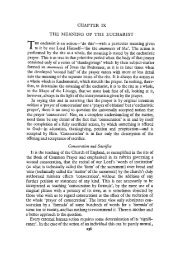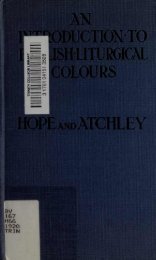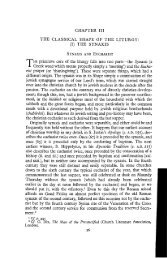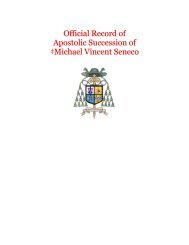Eucharist and Lord's Supper
Eucharist and Lord's Supper
Eucharist and Lord's Supper
Create successful ePaper yourself
Turn your PDF publications into a flip-book with our unique Google optimized e-Paper software.
62 THE SHAPE OF THE LITURGY<br />
text' (D, a, fj2, i, l) must certainly have existed in the early second<br />
century, as did also the 'longer text'. The 'Western text' reads very oddly,<br />
thus: (19 a ) 'And He took bread <strong>and</strong> gave thanks <strong>and</strong> brake it, <strong>and</strong> gave<br />
unto them saying, This is My Body. (21) But behold the h<strong>and</strong> of him that<br />
betrayeth Me is with Me on the table.' Various attempts seem to have been<br />
made both in ancient times (e.g., bye; b; Syr. Sin.; Syr. Cur.) <strong>and</strong> by some<br />
modern scholars to amend the impossibly harsh transition from 19 a to<br />
21. But it looks as though all the ancient alternative forms of the 'shorter<br />
text' are secondary, despite the attempts made to defend some of them by<br />
various contemporary scholars.<br />
We can, I think, dismiss the attempt to explain away the 'shorter text'<br />
in all its forms as a deliberately manufactured version made in very early<br />
times to support the Encratite practice ofwineless eucharists. Such a mutilation<br />
would hardly have omitted the words 'which is given for you. Do<br />
this for the re-calling of Me' over the bread, unless it was made with<br />
excessivecarelessness.<br />
It seems sufficient at this point (in view of what we shall say later) to<br />
point out that whether this be what S. Luke wrote or not, it cannot as it<br />
st<strong>and</strong>s be a complete account of what happened at the supper. From the<br />
first the eucharist was always a corporate, not a private observance. These<br />
'bread eucharists' themselves are everywhere represented as essentially a<br />
rite of the christian society <strong>and</strong> not for the christian individual. But our<br />
Lord could nothave been understood to be giving such a corporate meaning<br />
to the bread-breaking alone without associating the breaking of bread £n<br />
some way w£th thecupof blessing at the end of the meal, since it was the use<br />
of the cup of blessing alone which distinguished the chaburah meal from an<br />
ordinary meal, <strong>and</strong> not the breaking of bread, which happened every time<br />
any pious jew ate, even alone. It cannot be entirely accidental that it is S.<br />
Luke alone, the only gentile writer among the New Testament authorities,<br />
who ignores the special importance <strong>and</strong> place of the cup of blessing at a<br />
chaburah meal from the jewish point of view. 1<br />
(3) What, finally, of the clinching point, the use of the term 'breaking of<br />
bread' alone to describe the whole rite of the eucharist in the Jerusalem<br />
church? Does that by its mere form exclude the use of the supposedly<br />
'Pauline' cup? The argument from silence could hardly appear more<br />
fragile. But in any case Acts xx. II describes S. Paul's celebration of the<br />
eucharist at Troas, in what purport to be the words of an eye-witness. And<br />
1 This does not account for the existence of the 'shorter text'. I hesitate to put<br />
forward a personal view on a matter in which I have no real competence. But it does<br />
look as though the 'shorter text' in its 'Western' form were that from which all the<br />
other extant variants developed as attempts to amend it. Yet I cannot persuade myself<br />
that it represents exactly what the author originally wrote. Rather, we have<br />
to do with a textual corruption almost at the fountain-head, which means that the<br />
problem is insoluble with our present materials. This is a very unsatisfactory conclusion.<br />
Nevertheless, if we do not know certainly what an author wrote, we can<br />
hardly hope to discern what he meant.



